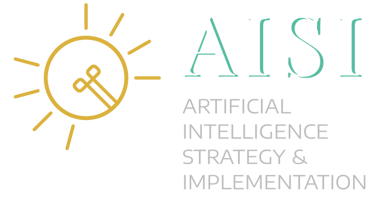Over 30 Essential Statistics on AI in Hospitality for 2025
Discover over 30 essential statistics on AI in hospitality and travel for 2025. Here is all the key AI technology data you could ask for in accommodation and travel AI, market growth, and the business case for AI-powered solutions.
AI IN HOSPITALITY AND TRAVEL
Garret Farmer-Brent
7/11/2025


The travel industry is undergoing a profound technological transformation. While traveler numbers are soaring, the real story is unfolding behind the scenes, powered by artificial intelligence. For professionals working in hospitality and travel, understanding this shift isn't just an option—it's essential for business growth.
This data-driven report distills extensive industry research into over 30 crucial statistics that define the state of AI in hospitality and travel today and what it means for your business tomorrow.
AI technology: a new the digital foundation
The opportunity for AI in travel is built on a massive digital landscape. The sheer scale of online travel activity creates the data-rich environment where artificial intelligence can deliver unparalleled value.
Billion dollar digital market: US digital travel sales are projected to hit $322.41 billion in 2025, growing steadily to $367.92 billion by 2028. This immense market is the foundation for AI-driven innovation (EMARKETER, 2025).
Global travel bookings surpass pre-pandemic levels: Gross travel bookings worldwide reached $1.61 trillion in 2024, significantly exceeding the $1.19 trillion from 2019, signalling a robust global recovery and increased demand for hospitality services (EMARKETER, 2025).
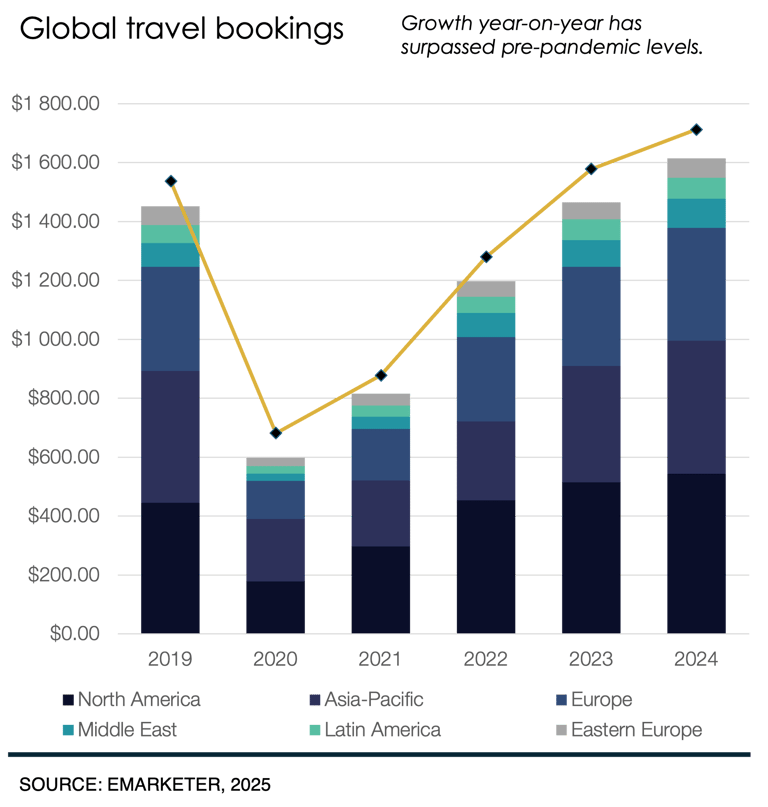

The 'Why': Unpacking the Business Drivers for AI Adoption
Investment in AI for hospitality isn't a future trend; it's happening now. The market is expanding at an explosive rate as businesses recognise AI strategy as essential for business growth.
An Exploding Market: The global AI in Hospitality market is projected to surge from $461.3 million in 2024 to $2.31 billion by 2029, a staggering 38.1% Compound Annual Growth Rate (CAGR) (The Business Research Company, 2025).
Businesses are the Driving Force: The primary engine behind this growth is the increasing demand from businesses for automation and process optimization to handle complexity and improve service, with 86% of travelers preferring automated rebooking for delays and cancellations (Insightace Analytic, 2025; Emarketer, 2025).
Deeper App Engagement: While app downloads have stabilized, "Travel and local" app sessions per active user increased from 11.0 to 11.3 in the last year, showing that travelers are using these platforms more intensively and creating more data for AI to leverage (Emarketer, 2025).
The Rise of Travel Media Networks (TMNs): Ad spend on TMNs (like Expedia's or United's ad platforms) is growing at 17.9% annually. This creates a new, data-rich ecosystem where AI is crucial for effective ad targeting and personalization (Emarketer, 2024).
The AI Gold Rush: Market Growth & Business AI
Different roles within a travel or hospitality organization see the value of AI through different lenses. Understanding these diverse motivations is key to successful implementation.
The Universal Goal is Efficiency: "Operational Efficiency" is a top AI adoption driver, fueled by the 80% of travelers who prefer automated self-service at hotels (Cozzio et al., 2025; Mews Survey, 2025).
The C-Suite's Strategic View: Top managers see AI as a strategic tool for "Competitive Advantage," a focus validated by the 142.8% conversion rate lift from AI-powered personalization (Cozzio et al., 2025; EMARKETER, 2025).
The Front Line's Practical View: Non-managerial employees see "Cost Saving" as the most critical benefit. This reflects AI's direct impact on daily operations, such as its ability to automate up to 80% of guest messaging, which frees up staff time and reduces labor costs (Cozzio et al., 2025; Canary Technologies, 2025).
Personalization as a Loyalty Driver: AI's ability to personalize is key to building long-term loyalty. 51% of potential members say they would be more likely to join a travel loyalty program if they received personalized offers, making AI a critical tool for customer acquisition and retention (Mintel, 2025).
AI as an Empowerment Tool: Successful AI strategies focus on augmentation, not replacement. Since 73% of tour travelers prioritize a knowledgeable guide, AI can manage repetitive tasks, allowing staff to focus on crucial guest interactions (Mintel, 2025).
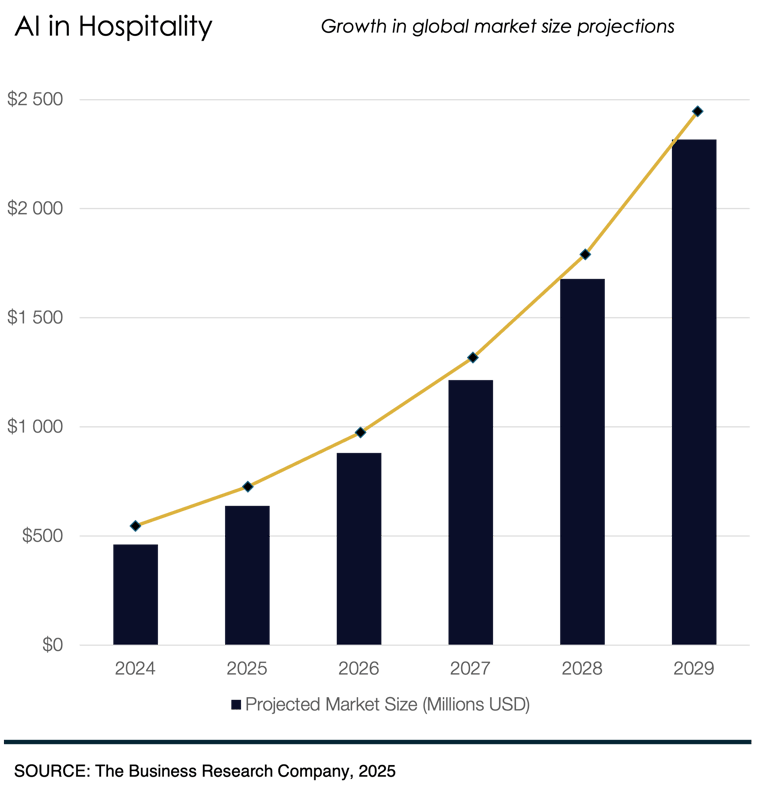

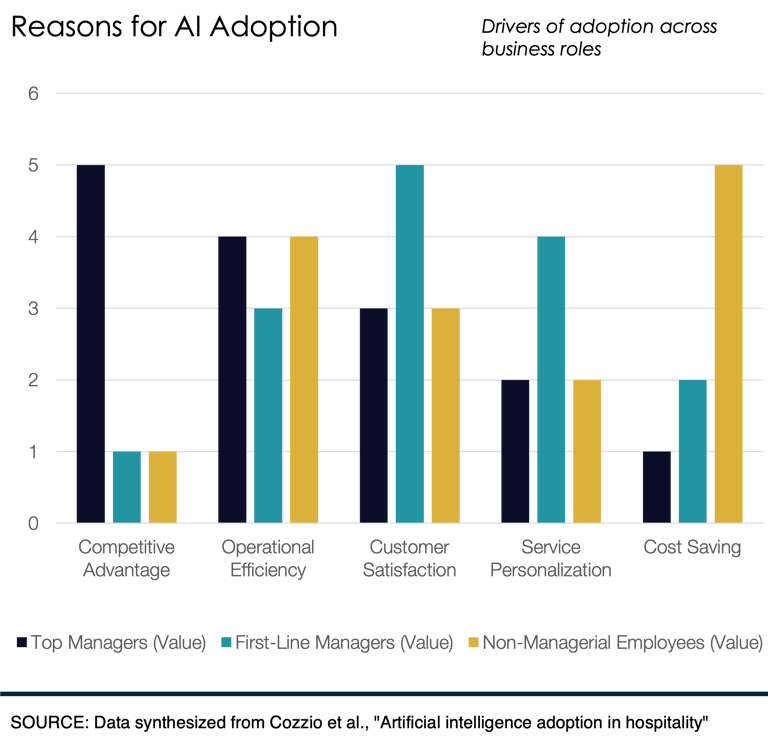

The Roadblocks: Overcoming Barriers to AI Integration
While the case for AI in business is strong, implementation comes with challenges. Acknowledging these hurdles is the first step to overcoming them.
The Human Hurdle: The top barrier to AI adoption is internal "Resistance to Change." This reflects a continued need for human interaction, as 82% of UK travelers would rather speak to a human than an AI chatbot—a key challenge in a service-first industry (Cozzio et al., 2025; Mintel, 2025).
The Knowledge Gap: For managers, a primary obstacle is a "Lack of Awareness and Understanding" of what AI can realistically achieve. This is mirrored on the consumer side, where only 25% of travelers have used generative AI for travel planning, showing that the technology's potential is not yet widely grasped (Cozzio et al., 2025; Kantar, 2025).
The Usability Challenge: For front-line staff, "Technical Complexity" is a major concern. This is echoed in consumer behavior, where 56% of travelers are open to using simpler "smart search" functions on websites, but only 36% are interested in using more complex AI chatbots, which can be perceived as less intuitive (Cozzio et al., 2025; Mintel, 2025).
Budgetary Headwinds: Nearly a quarter (23%) of travel and hospitality advertisers are bracing for budget cuts, which could slow down technology investments (EMARKETER, 2025).
The Customer Trust Factor: Only 38% of US vacation bookers currently find AI-generated recommendations "helpful," indicating a trust and quality gap that businesses must close to realize AI's full potential (EMARKETER, 2025).
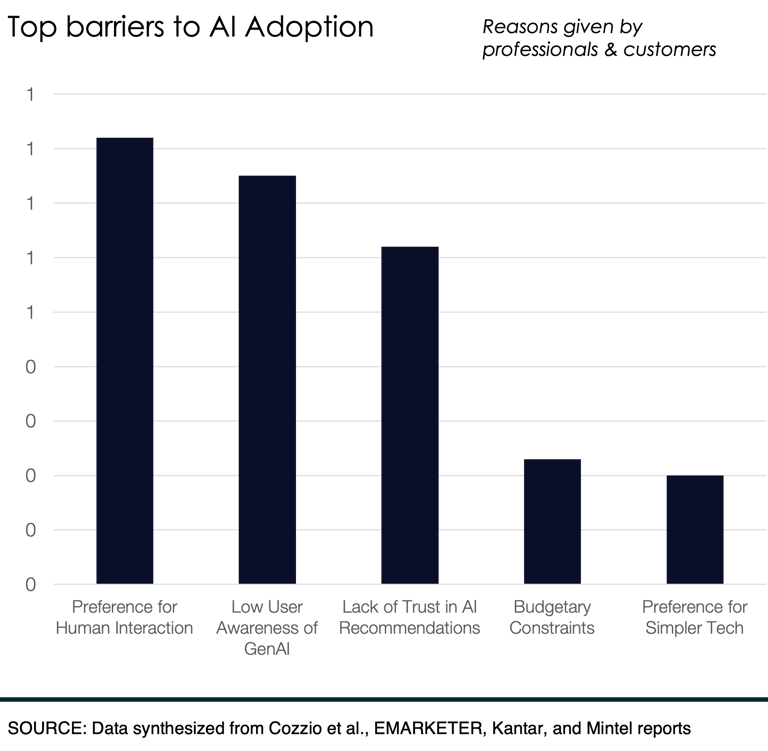

The Traveler Is Changing: How Consumer Behavior Demands AI-Powered Solutions
Modern traveler behaviors are creating operational complexities that can only be solved with AI. Businesses that fail to adapt will be left behind.
The Shrinking Booking Window: The average booking window for summer travel has compressed to just 21 days, making AI-driven dynamic pricing and revenue management essential for profitability (EMARKETER, 2025).
The Demand for Self-Service is Non-Negotiable: The preference for self-service directly impacts booking decisions, with 73% of travelers stating they are more likely to choose a hotel that offers self-service technology (Hotel Technology News, 2025).
Travelers Want to Filter by "Vibe": 36% of travelers want to filter search results by how busy a destination is, and 30% want to filter by "travel motivation" (e.g., relaxation, adventure), requiring sophisticated, AI-powered search (Mintel, 2025).
Social Media is the New Search Engine: 37% of travelers now perform most of their travel research on social media, demanding an AI-driven approach to content strategy and marketing (Kantar, 2025).
Overtourism is Reshaping Itineraries: 41% of UK holidaymakers have been put off visiting a destination due to overtourism, creating a business opportunity to use AI to recommend compelling, lesser-known alternatives (Mintel, 2025).
The Unpackaged Package Holiday: A massive 89% of package holidaymakers prefer a package that can be customized to their personal preferences, a task perfectly suited for AI-powered booking engines (Mintel, 2025).
Practical Tech Beats Novelty: Travelers find practical tech most useful. The top 3 are: Mobile apps (89%), automated rebooking (86%), and digital baggage tracking (86%)—all areas where AI can enhance functionality (EMARKETER, 2025).
The Rise of Multi-Experience Trips: The trend towards multi-experience trips is accelerating. The share of UK travelers describing their main holiday with three or more distinct holiday types (e.g., a city break combined with a beach stay and a cultural tour) has jumped from 11% to 17% in just two years. This demand for complex, hybrid itineraries creates significant planning challenges that require sophisticated AI to package, price, and manage effectively (Mintel, 2025).
The Financial Case: Where AI Delivers Tangible ROI
Ultimately, AI technology investments must deliver a return. The data shows clear pathways for AI to directly boost revenue and customer lifetime value.
High-Value Onboard Services: 88% of airline passengers are interested in onboard Wi-Fi. Offering it as a premium amenity or a perk for loyalty members is a proven AI-enabled revenue strategy (Mintel, 2024).
The Untapped Loyalty Market: Over half (52.7%) of US internet users do not belong to any airline loyalty program, representing a massive, untapped market for AI-driven engagement (EMARKETER, 2025).
Personalization Unlocks Loyalty: 51% of potential members say they would be more likely to join a travel loyalty program if they received personalized offers (Mintel, 2025).
The Power of the Upsell: 33% of UK holidaymakers are willing to pay more for a personalized travel itinerary, a direct revenue opportunity for travel providers using AI tools (Mintel, 2025).
A Simple, High-Margin Revenue Driver: The #1 add-on hotel guests are willing to pay extra for is the ability to select their specific room (41%), an easy upsell to integrate into AI-powered booking systems (Mintel, 2024).
The Glamping Opportunity: 53% of hotel guests are interested in glamping experiences at a hotel's site, signaling strong demand for new, high-margin accommodation products (Mintel, 2024).
The All-Inclusive Advantage: 74% of hotel guests are interested in all-inclusive deals, which helps businesses secure more upfront revenue and increase the total spend per guest (Mintel, 2024).
Conclusion: The Intelligent Path Forward
The data is clear: the travel and hospitality industry is at a critical juncture. Artificial intelligence is no longer a futuristic concept but a present-day necessity for operational efficiency, deep personalization, and competitive survival. While internal challenges like resistance to change and knowledge gaps are real, the external pressures from evolving traveler behavior and the undeniable financial ROI make AI adoption an imperative.
The question for industry leaders is no longer if they should adopt AI, but how they can integrate it strategically to empower their teams, delight their guests, and secure their position in the market of tomorrow.
Is your business prepared to capitalize on these trends? Don't get left behind. Our consultancy specializes in implementing tailored AI strategies that drive revenue and operational excellence in the travel sector. Contact us today to schedule a complimentary AI Opportunity Analysis and discover how you can build your intelligent transformation.
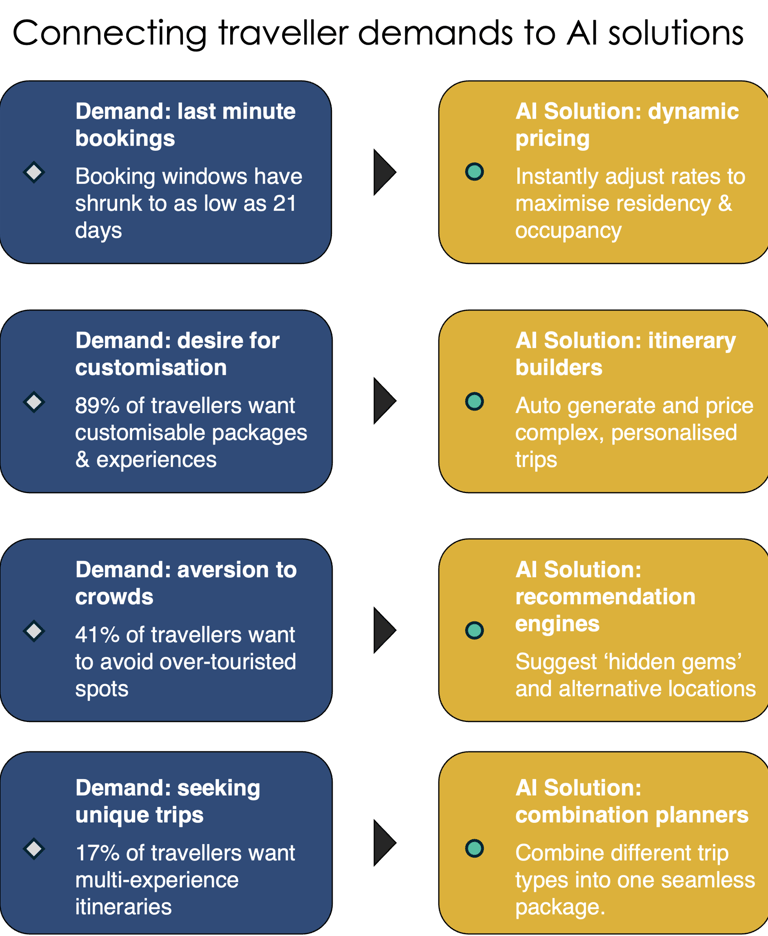

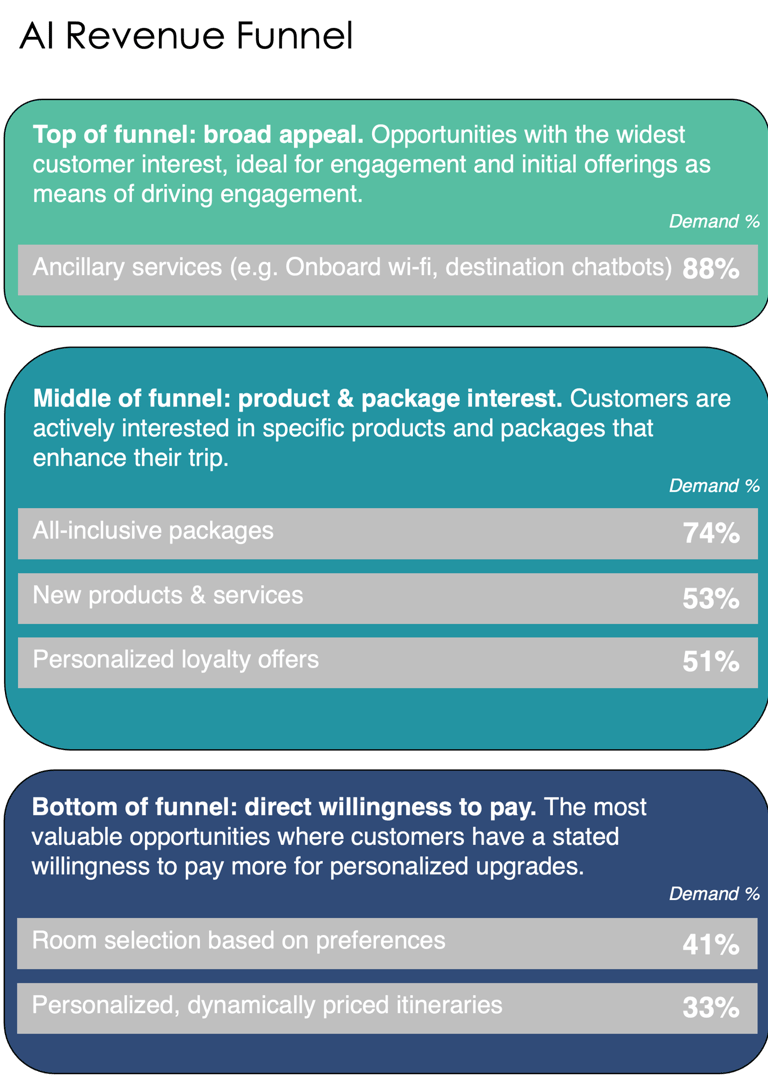

Is it time to consider what AI solutions your hospitality or travel business needs to reach the next level?
Begin your AI business upgrade today by taking our comprehensive AI Readiness Assessment.
You'll receive a full business analysis report at no charge.
